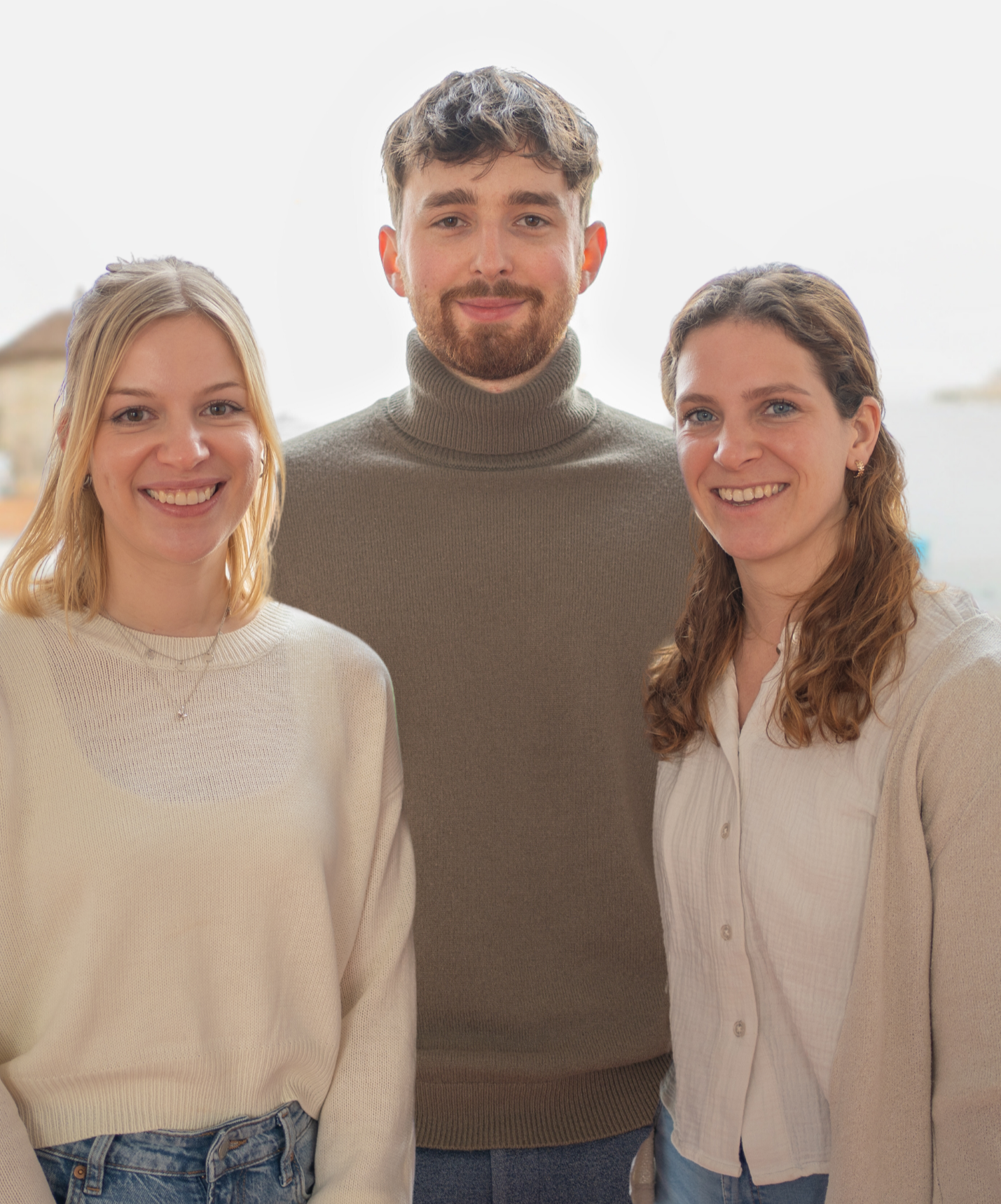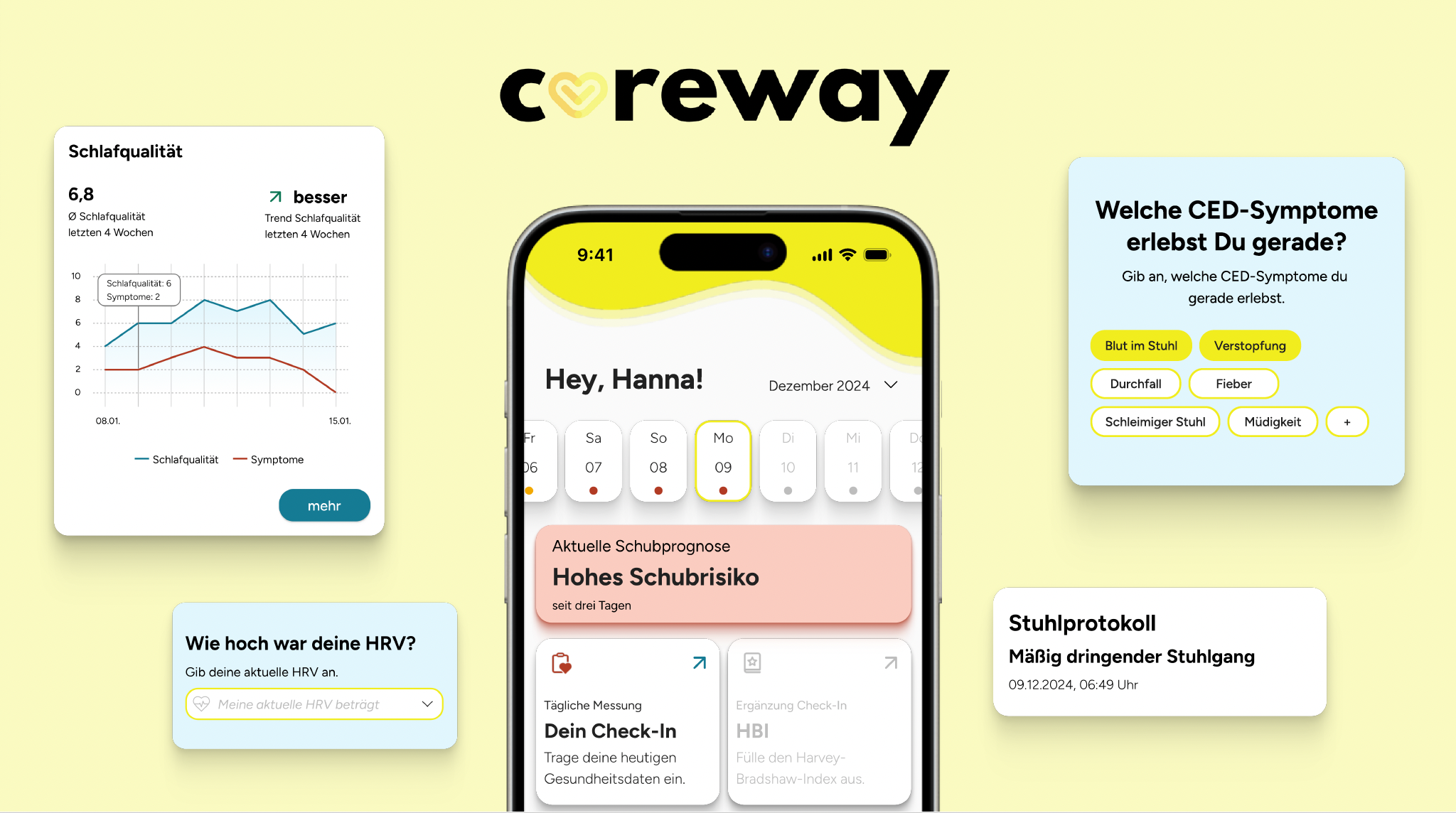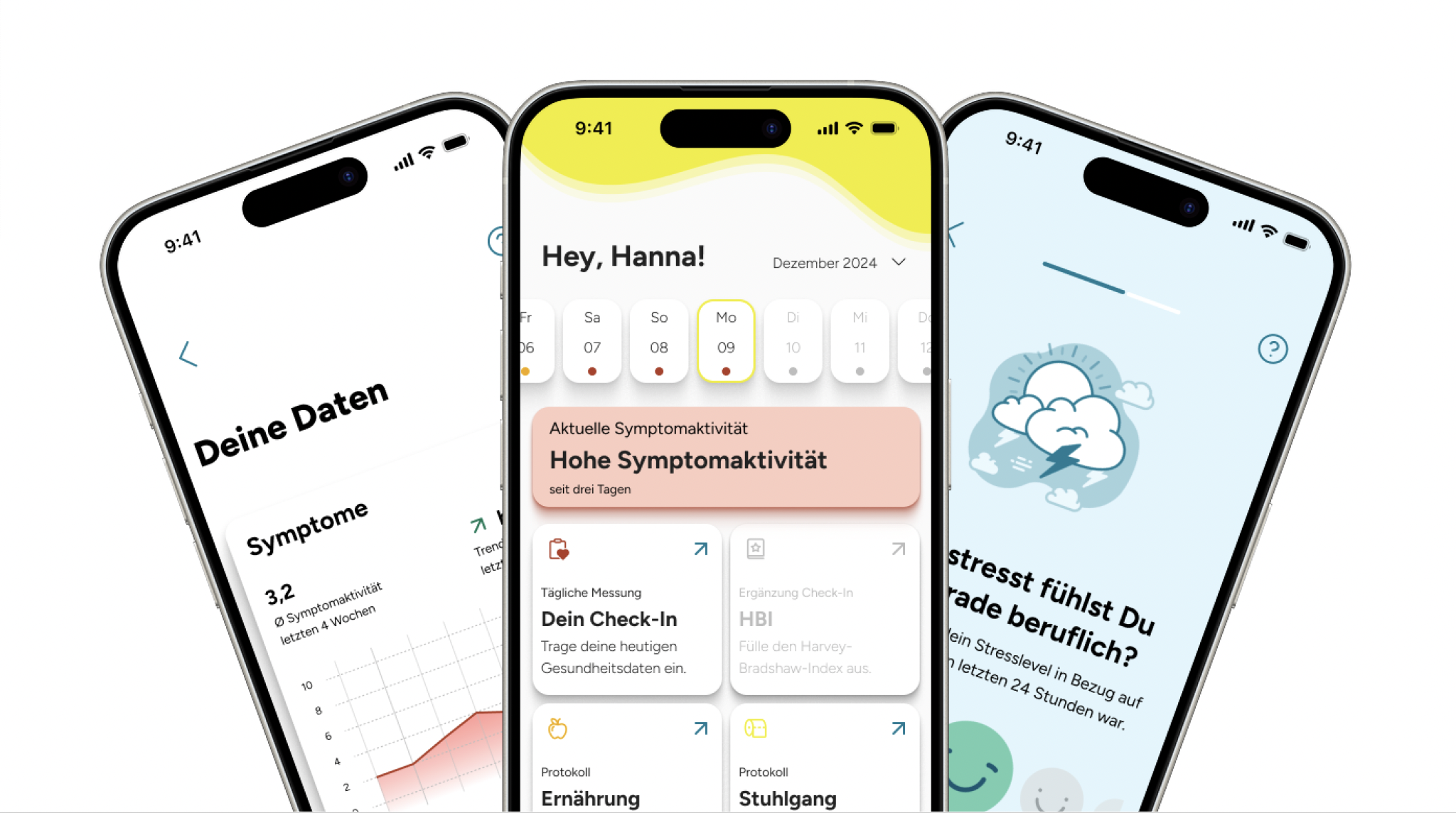Diagnostic tool for people with Crohn's disease and ulcerative colitis
Chronic inflammatory bowel disease - using an app to sustainably improve everyday life
Keeping appointments? Planning everyday life? For people living with chronic inflammatory bowel disease (IBD), sudden and unpredictable flare-ups can severely limit their ability to participate in daily life. The start-up coreway aims to improve the quality of life for individuals affected by IBD by leveraging data-driven insights and contributing to the advancement of personalised medicine.
'Incurable' - for many people affected by inflammatory bowel disease (IBD), this diagnosis can sound devastating. But what does it really mean? IBD sufferers are often keen to find reliable information about the causes, background and practical strategies for coping with the disease. One thing is certain: everyday life with IBD is extremely challenging. This is where coreway comes in. The medtech start-up from Baden-Württemberg is committed to helping people with IBD lead more informed, supported and empowered lives.
650,000 sufferers in Germany: how IBD manifests itself
Chronic inflammatory bowel diseases such as Crohn's disease and ulcerative colitis cause inflammation in the bowel. While Crohn's disease can affect any part of the digestive tract and penetrate all wall layers, ulcerative colitis usually only affects the mucous membranes of the large intestine.
Symptoms also differ somewhat: Crohn’s disease often presents with chronic diarrhoea and pain in the lower right abdomen, whereas ulcerative colitis is typically marked by bloody, mucus-filled diarrhoea and pain on the left side of the abdomen. The primary cause is thought to be a genetic predisposition that leads the immune system to mistakenly attack the body’s own gut bacteria. However, dietary factors and environmental influences may also contribute to the development and progression of the disease.
Inflammatory bowel disease (IBD) typically develops before the age of 30. "It’s important to document symptoms thoroughly and be persistent so that medical professionals can apply reliable diagnostic methods to either rule out or confirm IBD," says Hanna Schuler, one of the co-founders of coreway. Diagnosed at the age of 26, she experienced frequent flare-ups and debilitating abdominal pain that often left her bedbound. "Around 650,000 people in Germany live with IBD. I realised I was not alone. It also made one question all the more pressing for me - how can we navigate this uncertainty in everyday life?"
Managing and alleviating IBD - with a digital tool
 The founding team of coreway: Selina Hörig (left), Philipp Emonds (centre) and Hanna Schuler (right) develop digital solutions for people with IBD. © coreway UG
The founding team of coreway: Selina Hörig (left), Philipp Emonds (centre) and Hanna Schuler (right) develop digital solutions for people with IBD. © coreway UGThe idea for a digital solution was born in the summer of 2023, during Hanna Schuler’s Master’s programme in Health Promotion and Prevention at Stuttgart Media University (HdM). Together with fellow student Selina Hörig, she initially developed the concept as a fictive business project. "Selina was immediately drawn to the topic of IBD," Schuler recalls. "We thought: instead of withdrawing or relying solely on medication, those affected should be supported holistically - with structured management, tailored nutrition, physical activity and relaxation techniques." And so, the idea for the IBD support app was born.
The two Master’s students combined medical expertise, personal experience and data-driven methods with a clear goal: to detect IBD flare-ups at an early stage with the aim of preventive intervention. In the long term, their approach aims to reduce both the frequency and severity of relapses." Everyone is different, which is why we track individual data points," the women explain. "This enables those affected to better understand their condition and receive personalised, actionable recommendations - helping them to manage their disease more effectively and, ideally, prevent flare-ups altogether."
With health strategist Selina Hörig and communications expert Hanna Schuler at the helm, the project got off to a perfect start. Supported by an EXIST start-up grant, the young team - joined by Philipp Emonds - successfully launched a beta version of their app in early 2024. A pilot study involving volunteers with IBD has been underway since then. Participants enter daily health-related data, which is anonymised in accordance with GDPR standards and used to generate new insights into disease patterns and personalised management strategies.
Deep insights for a better outsight
 Job, leisure, sport – IBD integrated into everyday life: With the Coreway app, patients can easily record their health data via a smartphone. © coreway UG
Job, leisure, sport – IBD integrated into everyday life: With the Coreway app, patients can easily record their health data via a smartphone. © coreway UGThe forecasting tool integrates multiple health parameters to predict symptom activity in the days ahead, helping users to better manage their condition. The CorewayInsights app collects a range of health data - including symptoms, stress levels and heart rate variability (HRV) - and supplements this with information on digestion, stool patterns, body temperature and sleep quality.
Heart rate variability (HRV) - the variation in time intervals between heartbeats - is a key indicator of both physical and mental stress. A low HRV often signals stress, illness or mental fatigue, whereas a high HRV reflects recovery, strong fitness and resilience.
"HRV varies from person to person," explains Schuler. "That’s why it’s important to focus on your own baseline values." While some factors - like age and genetic predisposition - are beyond our control, many others can be positively influenced, including sleep quality, diet, exercise and relaxation. These are exactly the areas that coreway prioritizes.
Digital prevention as the key to quality of life
All data collected is integrated into personalised recommendations. The CorewayInsights app, already approved as a Class I medical device, serves as the foundation for ongoing research and development.
 The CorewayInsights app records subjective information and objective vital data - a basis for personalised recommendations and the prediction of disease flare-ups. © coreway UG
The CorewayInsights app records subjective information and objective vital data - a basis for personalised recommendations and the prediction of disease flare-ups. © coreway UGThe next step is CorewayPredict, a Class IIa medical device. By leveraging health and sensor data combined with machine learning, it identifies individual patterns and develops an early warning system for disease flare-ups. Certification is underway through a PMCF1) (post-market clinical follow-up) investigation involving 200 patients. As Schuler explains, "Our solutions are grounded in the S3 guidelines for Crohn’s disease and ulcerative colitis, as well as the latest scientific research." Key partners include the University of Southern Denmark and Stuttgart Media University.
Coreway was accepted into the 4C Accelerator programme for medtech start-ups and receives government funding to support research and product development. "Right now, we are especially focused on strengthening clinical partnerships - such as collaborating with hospitals and medical networks - to expand our studies and gather real-world application data," explains Schuler. Additionally, coreway is seeking strategic partners in medical technology and digital health. "We want partners who share our long-term vision and can assist us with certification, scaling and international expansion."
The successful completion of a feasibility study (proof of concept) has already demonstrated the method’s potential: combining subjective data with objective vital parameters provides a solid foundation for accurately predicting disease relapses.
The coreway team now consists of ten people with expertise in business, IT, data science, deep learning and wearable sensing. In future, the platform will be expanded to include areas such as nutrition tracking, mental health and other biomarkers – in closer cooperation with clinics and research institutions.